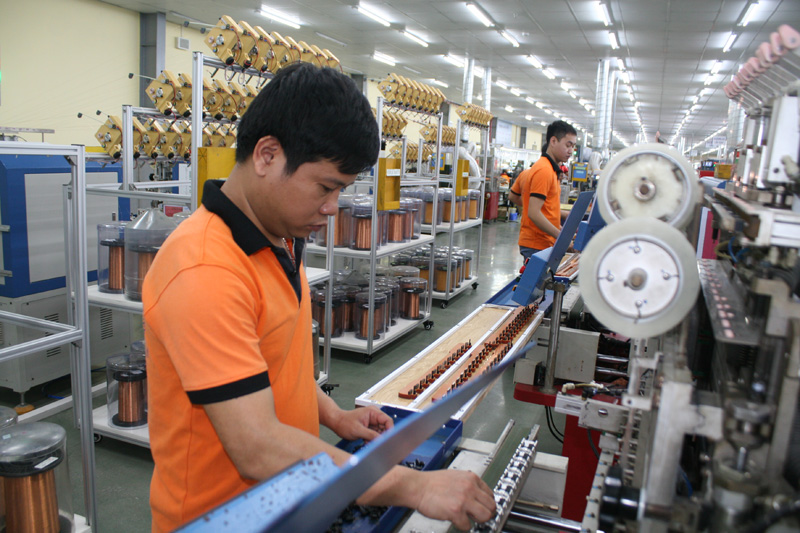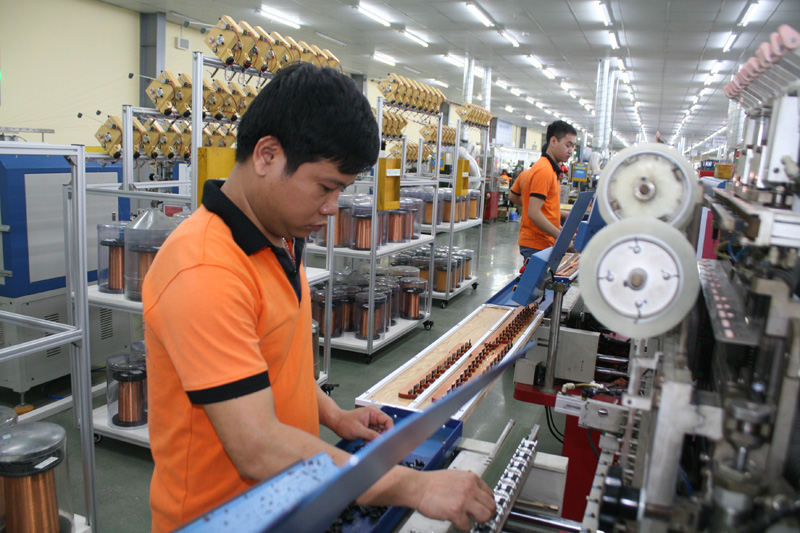
HBO - Hoa Binh province’s Taxation Department targets to collect 1.42 trillion VND in budget revenue in the first half of the year, accounting for 48 percent of the Government’s estimate and 39 percent of the resolution adopted by the provincial People’s Council. To realise the target, the department has been focusing on implementing measures to improve tax administrative procedures, control sources of income, and facilitate tax payers’ payment fulfillment.
 Korean Transon
Co., Ltd receives support to carry out its project at Luong Son industrial
park. It has created jobs for 1,600 local labourers.
Korean Transon
Co., Ltd receives support to carry out its project at Luong Son industrial
park. It has created jobs for 1,600 local labourers.
State
budget collection totalled 705 billion VND in the first quarter, equivalent to
24 percent of the Government’s estimate for the whole year, 19 percent of the
resolution of the provincial People’s Council, 95 percent of the province’s
estimate for the time, and up 4 percent from the same period last year.
Earnings from taxes and fees (excluding land use fees) were reckoned at 672.7
billion VND, equal to 25 percent of the Government’s estimate, 22 percent of
the resolution of the provincial People’s Council, and increasing 7 percent
year on year. Meanwhile, the province collected 32.3 billion VND from land use
fees, making up of 12 percent of the Government’s estimate, 5 percent of the
provincial People’s Committee, and 65 percent of the amount recorded in 2018’s
Q1. It was reported that higher budget collection was made in 9 out of 17 items
subject to tax payment.
Following the direction of the General Department of Taxation and the
provincial People’s Committee, the provincial Taxation Department has
comprehensively implemented a set of tax management measures to fulfill state
budget collection target in Q2 and the whole 2019. Those include accelerating
the tax administrative procedure reform during 2016-2020 as approved by the
Ministry of Finance, reviewing the reform in line with the Government’s Decree
No.02/NQ-CP and the provincial People’s Committee’s Decision No.02/QD-UBND
dated January 2, 2019 on promoting business climate and improving local
competitive capacity in 2019 and the following years.
Besides, increasing communications campaign and training on tax policies,
providing e-service for tax payers, identifying potential areas for tax collection
and enhancing management of tax collection will be put at the first line of
solutions to ensure that all of the business establishments in the province
fulfill their tax payment duties.
According to data from the Hoa Binh Provincial Party Committee, the industrial production index for the first six months of 2025 is estimated to have increased by 20% compared to the same period last year. This marks the highest year-on-year growth rate for this period since 2020.
In the first six months of 2025, Hoa Binh province’s export turnover was estimated at 1.145 billion USD, marking an 18.11% increase compared to the same period in 2024. Import turnover was estimated at $ 804 million, a 17.15% increase, which helped the province maintain a positive trade balance.
The lives of the ethnic minority farmers in Tan Lac district have gradually improved thanks to the new directions in agricultural production. This is a testament to the collective strength fostered through the professional associations and groups implemented by various levels of the district’s Farmers’ Union.
With the motto the "product quality comes first,” after nearly one year of establishment and operation, Muong village’s Clean Food Agricultural and Commercial Cooperative, located in Cau Hamlet, Hung Son Commune (Kim Boi district), has launched reputable, high-quality agricultural products to the market that are well-received by consumers. The products such as Muong village’s pork sausage, salt-cured chicken, and salt-cured pork hocks have gradually carved out a place in the market and they are on the path to obtaining the OCOP certification.
In the past, the phrase "bumper harvest, rock-bottom prices" was a familiar refrain for Vietnamese farmers engaged in fragmented, small-scale agriculture. But today, a new spirit is emerging across rural areas of Hoa Binh province - one of collaboration, organisation, and collective economic models that provide a stable foundation for production.
Maintaining growing area codes and packing facility codes in accordance with regulations is a mandatory requirement for agricultural products to be eligible for export. Recently, the Department of Agriculture and Environment of Hoa Binh province has intensified technical supervision of designated farming areas and packing facilities to safeguard the "green passport" that enables its products to access international markets.



 Korean Transon
Co., Ltd receives support to carry out its project at Luong Son industrial
park. It has created jobs for 1,600 local labourers.
Korean Transon
Co., Ltd receives support to carry out its project at Luong Son industrial
park. It has created jobs for 1,600 local labourers.